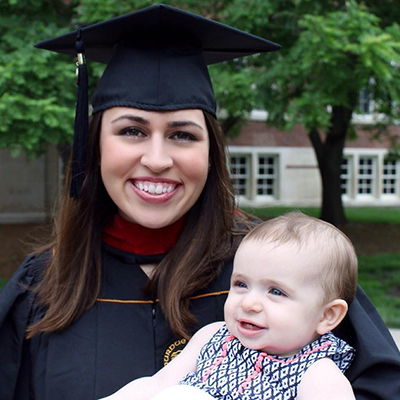Andrea Thomas, technology writer for Information Technology at Purdue (ITaP), graduated with her master’s degree focused on leadership in May 2015. We asked her to reflect on her time in the program, which was administered by the Center for Professional Studies in Technology and Research in the Purdue Polytechnic Institute.
Choosing her degree program
 My ideal educational journey would have followed a seamless path to a graduate program after earning my bachelor’s degree from Purdue in 2008. However, that was a rough year to enter the workforce, and I had a healthy amount of student loans to pay back. I ended up spending a couple years in the journalism industry and working odd jobs before taking a writing position within Purdue’s central IT organization, ITaP.
My ideal educational journey would have followed a seamless path to a graduate program after earning my bachelor’s degree from Purdue in 2008. However, that was a rough year to enter the workforce, and I had a healthy amount of student loans to pay back. I ended up spending a couple years in the journalism industry and working odd jobs before taking a writing position within Purdue’s central IT organization, ITaP.
Until that point, my goal of pursuing a graduate degree was on the back burner. But after settling in to my new job at Purdue, I had a “carpe diem” moment. While the idea of committing 2-3 years to an academic program was daunting, I reminded myself that it would not be any easier or more convenient to pursue in the future. Also, several of my colleagues had been awarded an ITaP Scholarship, and the prospect of financial assistance from my organization settled any doubts I might have had.
I chose ProSTAR for a variety of reasons. First, the hybrid model of distance-learning and on-campus classes three weekends a semester gave me the flexibility to study and complete homework at my own pace without infringing on my full-time work responsibilities. As a non-traditional student, I found the program to be extremely adaptable to my needs in terms of work-life-school balance. In fact, I had a baby midway through the program and still was able to excel academically, thanks in large part to the way the weekend classes are structured. I also was drawn to my degree’s focus in technology, leadership, and innovation, which intersect with the job I do now and the positions I aspire to hold at Purdue. Although I investigated many other academic programs before making my grad school decision, ProSTAR ultimately fit me best in terms of course content, cost, and convenience.
What I know now
I switched majors twice when pursuing my bachelor’s degree, and the important lesson I learned from the experience is that you do less work when you’re fascinated by what you’re studying. So even though the career prospects didn’t look great from my vantage point as a creative writing major, I stuck with it because I had a passion for writing and communication; refining those skillsets helped propel me toward the career I’m in now, even though I couldn’t foresee the various writing-related opportunities that would open up for me in the future.
Applying that same principle to my grad school pursuits, I realized that I would be a better, more engaged student if I gravitated toward subject matter that held my attention. It sounds obvious and cliché, but when you do what you love, you’ll love what you do. I would also mention that there are opportunities, even within prescriptive programs, to explore niche interests. The ProSTAR faculty give students a lot of freedom to tailor research to their individual interests and passions, which made our classroom discussions and presentations even richer.
My favorite aspects of the program
I appreciated that the program is designed to accommodate a variety of students with different backgrounds, knowledge, skills, talents, and abilities. Even as a professional writer, I was given many resources to further hone my craft. The coursework gave me more confidence in my writing, which led me to draft a couple academic papers that have since been published, one as a journal article and one as a book chapter.
The absence of rigid parameters gave me the opportunity to explore a variety of subject areas that I previously knew little about. I still find myself quoting statistics from my research in meetings where discussions intersect with the topics I investigated, and it feels good to contribute scientifically sound information to the team.
Speaking of team, one of my favorite things about the program is the camaraderie I built with other members of my cohort. We had a diverse group with rich experiences in manufacturing, leadership, human resources, business services, and much more. Each person contributed his or her unique perspective to complicated issues, which made the learning experience very dynamic. I found myself thinking about many problems in new ways, which has helped transform my performance as a professional in a global workforce.
Of course, my favorite thing about the program was the feeling of accomplishment I experienced upon completion. It’s very empowering to set and achieve a lofty goal, even in the face of challenges and setbacks.
